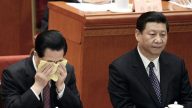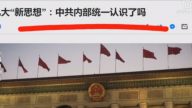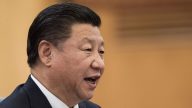【新唐人2014年10月21日訊】中共十八屆四中全會10月20號到23號在北京召開,這是從上個世紀七十年代以來,召開時間最晚的一次四中全會,也是中共全會歷史上,第一次將「依法治國」作為主題進行討論。事實上,「依法治國」已經被中共多次作為執政口號提及,不過目前中國仍然沒達到「依法治國」,原因到底是甚麼呢?
由於十八屆四中全會的召開,「依法治國」20號一躍成為在大陸媒體上出現率最高的詞彙之一。
事實上,「依法治國」這個詞早在1979年,就被中國學術界提出。之後中共在1997年,將「依法治國」寫入十五大的報告中,作為治理國家的基本方略。兩年後,九屆人大二次會議,將「依法治國」寫入憲法。之後在十六大、十七大和十八大的報告中,也都反覆提到過「依法治國」。
距離97年的十五大報告,已經過去了17年。那麼17年中,中共實踐「依法治國」的成效如何?
東南大學法學教授張讚寧:「現在中國的法治現狀非常糟糕。政府和司法機關都沒有嚴格依法辦案。侵犯公民合法權益的現象隨處可見。」
旅美國知名媒體人北風:「是不是真正的『依法治國』,我們不是要看它說甚麼,而是要看它做甚麼。最近這兩三個星期以來,超過七、八十國內的民眾,因為聲援、或者支持香港佔中運動,而被當局刑事拘留,並且都是尋釁滋事罪。這毫無疑問,看出來並不是依法治國。」
那麼是甚麼原因,讓「依法治國」的口號經歷了這麼長時間,仍然沒能在中國實現呢?
東南大學法學教授張讚寧:「造成中國長期不可能依法治國,而且所制定的現行法律也不可能真正落實、執行的主要原因,就是一黨專政。司法不獨立。中國的司法,公、檢、法、司,這幾家都要聽命於某一個政黨,某一個組織,這樣的法律,那就是不可能有真正的公平、正義可言,也不可能(有)真正的法治可言。」
「黨大於法」、「司法不獨立」也一直受到國內法學界和民間的批評。四中全會召開前,《財新網》、《新京報》等多個國內媒體,都刊登了國內法學專業人士對會議的建議,不約而同的提到「黨要守法」。也就是中共自身的權力必須要受到法律的約束。
北風:「這兩天有網友說,那你能不能首先中國共產黨依法登記註冊,成為一個可訴的主體。比如說,當民眾對黨的方針政策有甚麼不滿的時候,大家能夠通過司法渠道來解決問題。但是我們也知道,這一點是不大可能做的到。那在中國一個顯而易見的東西就是,你首先共產黨能不能在法律框架內活動,沒有壟斷和超越的法律地位,如果可以,那我想,依法治國才能夠開始談起,否則一切都是空談。」
除了是否能使中共權力真正受到約束之外,這次會議強調的「依法治國」,對像究竟是官還是民,也是外界正在觀察的。
「法治三老」之一、86歲的郭道暉對國內媒體說,依法治國的要害或者關鍵,是要依法治國家權力。國家權力的載體是國家的官員,所以首先要依法治「官」。但是這個概念並沒有被官員接受。
而中國人民大學政治學教授張鳴對「德國之聲」表示,當局主要是想依靠法律來更好地統治民眾。所謂的「法治」就是「以法治民」。要想把這方面扳過來,還有很長的路要走。張鳴表示,真正的法治,首先要求執政者必須守法。
採訪編輯/尚燕 剪輯/舒燦
Why Is It So Difficult To Carry Out “Rule by Law"?
Between Oct 20 and 23rd, the 4th Plenary Session of the 18th
Chinese Communist Party (CCP) Central Committee,
is being held in Beijing.
This is actually the first time in CCP plenary sessions
history, to discuss the topic “rule by law".
Although “rule by law" has been mentioned as the ruling slogan
of CCP many times over the years,
now is the first time it is being discussed.
China still did not reach the status of “rule by law",
so what reasons are there for this change?
Since the 4th Plenary Session of 18th CCP being held,
“rule by law" has become one of the terms used with the highest
degree of so called importance,
according to mainland media since Oct. 20.
In fact, the term “rule by law” was proposed
by Chinese academia as early as 1979.
In 1997 “rule by law" was written into the 15th CCP
Conference Report,
as one of the basic strategies of governing the country.
Two years later, the Second Session of the Ninth
National People’s Congress,
revised the constitution by adding the “rule by law".
In the following 17th and 18th Conference Reports,
“rule by law" was also repeatedly mentioned.
From the time of publishing 15th CCP Conference report
in 1997 to today, 17 years have since passed.
So during these 17 years, how did the CCP practice
“rule by law" ?
Southeast University law professor Zhang Zanning:
“Now the status quo ‘rule by law’ in China is very bad.
The Government agencies and judiciary system
are not strictly in accordance with the law
to implement the administration.
The phenomenon of infringing
the citizen’s legitimate rights is pervasive."
Well-known media worker Bei Feng is now living
in North America.
He says: “For the topic of whether it really is ‘rule by law’ or not,
we need to look at what it has done rather than what it says.
During the past two or three weeks, more than seventy
to eighty people in Mainland China
have been punished with criminal detention by the crime
of disturbing the peace and provoking conflict,
due to supporting Occupy Central in Hong Kong,
which is easily seen, no doubt, as no rule by law. “
So what reasons led to the failure of achieving “rule by law"
after the slogan was used in China for so many years?
Professor Zhang Zanning: “The main reason the rule by law
was never totally realised in China,
is mainly due to the ‘One Party Dictatorship’.
The judiciary system is not independent of China’s judiciary
public prosecutors,
the court and all others, need to toe the party line
or a certain group or organisation.
Such a law might not really bring any real fairness
and righteousness, let alone a real rule by law at all."
“The CCP is superior to the law" and “the judiciary
is not independent".
This has been criticised by domestic law experts
and folk scholars.
Before 4th Plenary Session was held, “Caixin", “Beijing News"
and other national media,
published advice given from the domestic legal professionals.
They invariably referred to it as, “the CCP must abide
by the law".
That means the power of the CCP itself
must be bound by the law.
Bei Feng: “In the recent two days, some netizens have said:
Is it possible to first register the CCP according to law
and make the CCP become a mitigable entity?
For example, when people have some discontented aspects
upon CCP’s guidelines and policies,
all sides are able to resolve the problems by judicial channels.
But we also know, this point is unlikely to be achieved.
So in China, one obvious thing within the framework
of the law is:
if the CCP can behave within the legal framework
and without a legal status of monopoly.
If this is possible, in my opinion, the Rule By Law can be
discussed, otherwise everything else empty."
In addition to whether the CCP power can truly be bound
by outside powers,
the “rule by law" emphasised by the meeting, is mainly either
for the official or the people,
people are watching the outcome.
One of three senior legal experts is 86-year-old Guo Daohui,
Guo told domestic media, the key place of rule by law
is to rule the national power.
The national power are embodied by national officials.
So in the first case, we need to punish the officials.
But this concept will not be accepted by the officials.
The Chinese People’s University political science
professor Zhang Ming says to “Deutsche Welle" that,
the authorities mainly rely on laws to better ruling over people.
So-called “rule by law" is actually to punish people by law.
If we want to resolve this issue, there is still a long way to go.
Zhang Ming said that a true rule by law will first
require the rulers to openly obey the law.
Interview & Edit/ShangYan Post-Production/ShuCan





















